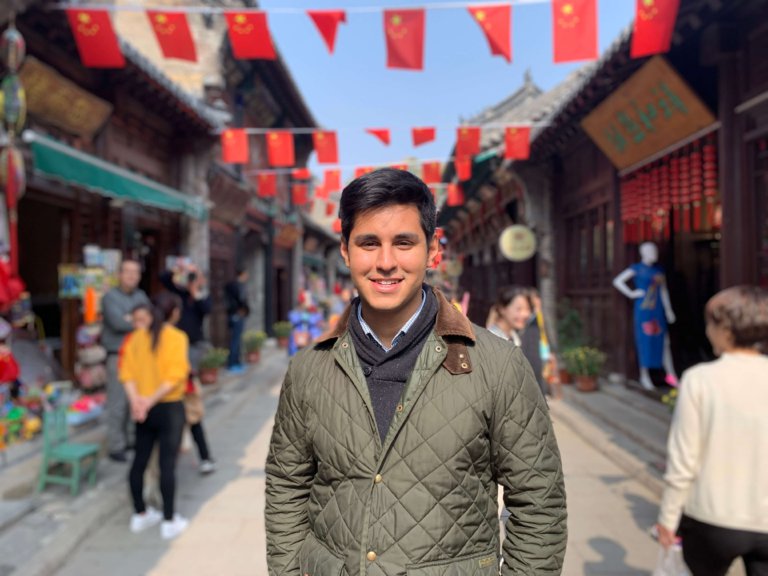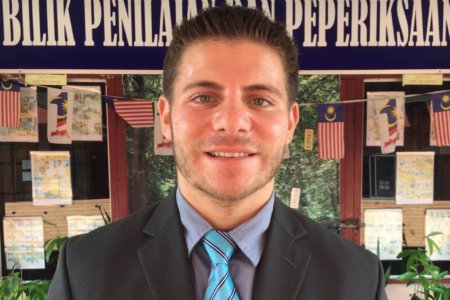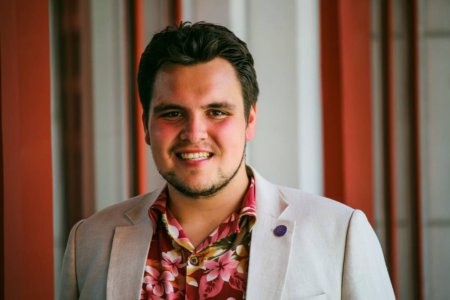
Coming from a diverse district in the US, Christopher Sperrazza has always been passionate about public service. After graduating magna cum laude from Hunter College with a BA in Political Science and Government in 2019, he sought to achieve even more. After all, his mother, who immigrated to the US from Ecuador, always pushed for him to have the best education possible.
This led him to apply for the prestigious Schwarzman Scholarship programme at Tsinghua University, one of China’s highest-ranked universities, to pursue a Master of Management Science in Global Affairs. He won it.
Schwarzman Scholars Introduction Video – Christopher Sperrazza from Chris Sperrazza on Vimeo.
China’s breathtaking feat in lifting 800 million people out of poverty in the past four decades bodes well with Sperrazza’s focus on poverty reduction and specialty in homelessness and shelter reform. He also gained insight and exposure into how the superpower is using economic might to reshape global power dynamics, particularly in the African and Southeast Asian region.
His proudest achievement, however, is learning how to speak Mandarin. Although his programme at Tsinghua University was taught in English, he wanted to know China deeper through face-to-face interactions. As his Mandarin was very limited when he first arrived, he channelled this as motivation to power through 8 a.m. Chinese language classes. The hard work paid off. Some of the New Yorker’s fondest memories of his time in China revolve around conversations with colleagues, classmates, and strangers on the street.
Below we speak to him more about his experience as a Schwarzman Scholar in Tsinghua University, China:
Was applying to be a Schwarzman Scholar intimidating?
I think that any highly competitive scholarship or fellowship poses a certain level of intimidation to the applicant. The nature of the application itself is quite daunting, as there is such a large pool of competition.

Christopher Sperrazza (far left) made sure he fully-integrated his learning experience in China as much as he could, even if it meant taking 8am Mandarin classes everyday. Source: Christopher Sperrazza
The initial round of written application materials, and a significantly smaller group competing in the final interviews can be nerve-wrecking. I was certainly intimidated, but I knew that if I didn’t apply to be a Schwarzman Scholar, I would regret it for the rest of my life.
Walk us through your experience studying for your master’s as a Schwarzman Scholar.
I think every Schwarzman Scholar is faced with the tough question of what to study during their year in China — either hone their expertise or explore new areas of study. I chose a combination of both, to focus on leadership courses covering various disciplines as well as to study China’s history and development.
The classes under the Schwarzman programme were thought-provoking and taught by leading academics in their fields. I found the biggest takeaways were not from the lecturers, but rather the classroom discussions. Debating fellow scholars on the most pressing topics of our times was a truly priceless learning experience.

This Schwarzman Scholar wanted to learn about China’s history and development to have a more global perspective on how the public sector works. Source: Christopher Sperrazza
Tsinghua University has made international headlines by being in the top 20 unis in the world. What do you think about this?
Tsinghua is a beacon for innovation and excellence in China, and it is evident the minute you step onto campus. You see people from all walks of life, and every corner of the world, convening to further their studies with the goal of improving the world.
Between the prestigious academic programmes and the vast beautiful campus, there is little question as to why this school is one of the top universities in the world. Although the school is distinctly Chinese, it is truly an international institution, as it boasts an impressive international student body. As a Schwarzman Scholar, a priority of my experience was to interact with people across the world. Tsinghua allowed for and promoted that exchange.
How have you developed your research interests as a Schwarzman Scholar?
Prior to being a Schwarzman Scholar, my research was primarily in American social policy, namely the study of innovative policy solutions for poverty alleviation. I used the Schwarzman Scholarship as an opportunity to explore different fields.

Besides his studies, Sperrazza (far left) enjoyed trying new foods and exploring the unknown. Source: Christopher Sperrazza
I ended up writing my graduate capstone on the aviation industry. Schwarzman matched me with a thesis advisor who was a seasoned professional with years of experience in both American and Chinese aviation. I wrote a market analysis on the transpacific commercial aviation market, and discussed the implications of Chinese market growth on American mainline carriers.
Describe how Tsinghua University’s environment, facilities and staff have supported your academic experience.
As a Schwarzman Scholar, you live and study in Schwarzman College — a beautiful modern building in the centre of Tsinghua’s campus. Although we have great facilities, one would be remiss by spending the majority of their time there as Tsinghua’s campus offers so many things to supplement your experience.
I would often participate in clubs on campus and made it my pet project to explore all of Tsinghua’s renowned canteens — something I unfortunately did not succeed in. I took a course at Tsinghua’s Law School, which was a unique and eye-opening experience about China’s legal structure.
What did you enjoy most about living in China, and how does it stand out from other countries?
What didn’t I enjoy? I felt like every day in China was a chance to learn, to meet new people, to try new food and to explore the unknown. Back home, there seems to be a disconnect in understanding China. An overly politicised topic, Americans tend to forget that China is more than just a country.

With a rich history and vibrant culture, exploring China was a great adventure for this graduate (far right). Source: Christopher Sperrazza
China carries with it a rich history and a vibrant culture. I enjoyed challenging my misconceptions, getting to experience new things and develop a new understanding of not only China, but of the world. This country champions convenience, from the metro, to the transnational train level, and e-payments, to ordering next-day delivery on TaoBao — it blew me away.
Do you think it would have made a difference if you had studied in a local institution?
To study at Tsinghua, amongst the trade war, tech competition, and overall decoupling between the US and China, was an incredible and unique experience. You are given a perspective that you have never been taught and engaged in conversation on topics that don’t come up in the US.
Understanding global affairs from the Chinese perspective will pay dividends, regardless of which career path I pursue because in one way or another, China — like the US — plays a role in every industry. I don’t feel I would have understood the bigger picture of US-China relations if I were to just study at a local uni.
Do you have any advice for international students looking to be a Schwarzman Scholar?
Start early, articulate clearly why you think studying in China will help you achieve your career goals, and do your best to express your passion in your application. At the most basic though, if you are having doubts of your credentials or background, know that there is no such thing as an average Schwarzman Scholar. We all come from different countries, unis and fields. The only way you would know if you are a competitive applicant is by submitting an application. Best of luck in this process!

Christopher Sperrazza recommends for you to express your passion when applying to be a Schwarzman Scholar. Source: Christopher Sperrazza
Catch up with Christopher Sperrazza through his social media: Twitter and Instagram.









